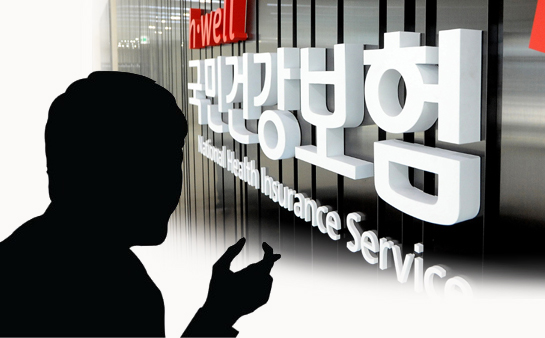In May 2015, a Mongolian came to Korea and gained access to health insurance after paying a monthly premium of about 100,000 won ($89) for three months. From August, the Mongolian began to receive cancer treatment for 241 days and went back to Mongolia as soon as finishing the treatment.

Also, a Korean-American suffering from cataract has recently received various treatments after finding out that local hospitals do not thoroughly check the national health insurance card of a patient. He entered Korea after renting an insurance card from an acquaintance and had 35 treatment sessions, including cataract surgery, during a one-year span. He benefited off several millions of won before going back to the U.S.
These are just a few out of numerous cases forcing the Ministry of Health and Welfare to toughen the nation’s public insurance system faced with a growing number “healthcare dine and dash” by foreigners. It happens when foreigners pay low insurance premiums and receive reimbursements for expensive treatment, including cancer, and leave the country upon completion.
According to the ministry’s data, almost 25,000 foreigners exploited the healthcare system from 2015 to 2017. The National Health Insurance Service (NHIS) estimates that unauthorized foreigners are using up to 1 trillion won.
Notably, since the government expanded its health insurance coverage of severe diseases, the number of abuses of the system by foreigners and overseas Koreans has rocketed.
To plug the hole in the national treasury, the ministry announced last week that it would extend the period for foreigners to become eligible for the country's health insurance program to six months, from the previous three months, provided they pay the average monthly premiums.
The ministry has also strengthened the level of punishment for those who borrow or lend health insurance to three years' imprisonment or a fine of 30 million won or less, from the past one-year imprisonment or maximum penalties of 10 million won.
“We changed the regulations as a follow-up of our announcement in June,” said an official at the ministry’s Division of Health Insurance Policy, wanting to remain anonymous because of her office’s principle. “The new amendment is expected to plug loopholes in foreigners’ and overseas Koreans' health insurance management, and enhance equity between Koreans and foreigners.”
In the same vein, the official added, his ministry would reduce the number of visa types that can apply for insurance premiums, according to their income and assets, as the ministry does for Koreans.
Until now, visa types that receive such benefits included F-1 (visiting or joining family), F-2 (resident), F-5 (permanent resident), and F-6 (marriage to Korean citizen) visas. Under the new amendment, however, only foreigners that have F-5 and F-6 visas will receive the aid, while F-1 and F-2 visa holders will have to pay extra premiums.
“The regulation regarding visas was first introduced to attract foreign students and activate the field of education and research in Korea,” the official said. “However, some foreigners and overseas Koreans are abusing the system, which in turn is adversely affecting the health insurance finances.”
Foreigners, who come to Korea to study or get married, will still receive health insurance as soon as they arrive in Korea, the official added
Although the ministry announced stricter measures to stop foreigners from exploiting Korea’s health system, problems such as free treatment for tuberculosis and no-charge care for refugees remain.
From July 2016, the government has been covering all costs related to treating tuberculosis. Foreigners can also receive free tuberculosis care after joining foreigners’ health insurance. Even if they do not have foreign health insurance, however, they still can get free medical treatment at public health centers or national TB hospitals nationwide.
The loose rules led to a foreigner to receive multi-drug-resistant tuberculosis treatments worth up to 50 million won in 2016 and left the country without paying a single dime.
According to the National Health Insurance Service (NHIS), the number of foreign patients suffering from tuberculosis treated in local hospitals tripled in a 10 year-span from 791 in 2007 to 2940 in 2016. Such numbers contradict the declining tuberculosis patients in Korea since 2011.
In a report published by the Korea Tuberculosis Association, the total number of tuberculosis patients in 2017 was 36,044, down 91.8 percent from the previous year. Such contrasts in the number of patients have raised concern among the public with many arguing that the system ostracizes Koreans.
“It is alarming that my tax money is going to treat foreigners, who seem to be exploiting the system that is meant first to benefit Koreans,” an office worker said, asking to remain anonymous. “Such benefits toward foreigners seem to be reverse discrimination against Koreans, who are paying the money to keep the national health insurance system running.”
The public is also criticizing the agency’s recent plans to allow refugees to join local insurance plans. Many fear that the new amendment will bring in a wave of medical refugees.
“The government’s plans to provide refugees with insurance can backfire as foreigners may falsely apply for refugee status,” the office worker said.
The ministry, however, noted that they are aware of public concerns and are creating an insurance system that can be beneficial to both parties. “The new regulation has been implemented for less than six months,” the official added. “Therefore we can’t say for sure if the new regulation will resolve the problem.”
Although too early to say, the ministry may extend the period again if the regulation does not make a significant difference, she added.

